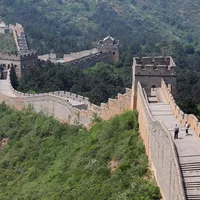284 在 火车 上 聊天
284 Chatten im Zug
284 Chatting on the train
284 Bavardage dans le train
284 電車の中でのおしゃべり
284 Conversar no comboio
284 在火车上聊天
在 火车 上 聊天
|||chatting
Discuter dans le train
安娜 * 正 坐在 从 北京 开往 * 东北 * 方向 * 的 火车 上 。
Anna||||||||||
Anna|||||headed towards|Northeast China|northeast direction|||
Anna* is on a train traveling from Beijing to the northeast.
Anna * est assise dans le train en direction du * nord-est * depuis Pékin.
她 在 车上 认识 了 两位 中国 姑娘 , 三个 人 一起 聊天儿 , 旅途 * 十分 愉快 。
||||||||||||voyage||
||on the bus|||two girls||young women|||||journey|very|very pleasant
She met two Chinese girls on the bus, and the three of them chatted together and had a *very* pleasant trip.
Elle a rencontré deux jeunes femmes chinoises dans le train, et les trois ont discuté ensemble, rendant le voyage * très agréable.
安娜 问 :“ 请问 你们 贵姓 ?
Anna|asked|May I ask||your surname
Anna asked: 'May I ask, what is your surname?'
” 一位 姑娘 回答 说 :“ 你 汉语 说 得 这么 好 , 请 猜猜 吧 : 我姓 ‘ 双木 '。
||||||||||||||Shuangmu
|young woman||||Chinese||||||Guess||My surname is|Shuāngmù
A girl replied: 'You speak Chinese so well, please guess: My surname is 'Shuangmu'.'
Une jeune fille a répondu : « Tu parles si bien chinois, devine : je m'appelle ‘Shuangmu'. »
” 另 一位 姑娘 回答 :“ 我姓 ‘ 古月 '—— 古代 * 的 月亮 。
|||||Guyu|||
another|||||Gu Yue|ancient times||
Another girl answered: 'My surname is 'Guyue' - the moon of ancient times.
Une autre jeune fille a répondu : « Je m'appelle ‘Guyu' — la lune de l'Antiquité. »
別の女の子は、「私の姓は 『Guyue』です。古代の月です。
” 安娜 很快 就 猜出来 了 。
Anna|||guessed it|
" Anna guessed quickly.
Anna a rapidement deviné.
两位 姑娘 问 安娜 :“ 你 打算 * 在 哪儿 下车 ?
||||||||get off
The two girls asked Anna, "Where are you going to get off?
Les deux jeunes filles demandent à Anna : "Où comptes-tu descendre ?"
” 安娜 也 请 她们 猜 一 猜 , 说 :“ 我要 去 的 城市 夏天 、 秋天 、 冬天 都 非常 短 。
|||||||||||||autumn||||short
Anna also asked them to guess, saying: 'The summer, autumn, and winter in the city I want to go to are all very short.'
"Anna leur demande aussi de deviner, en disant : "La ville où je vais a des étés, des automnes et des hivers très courts."
” 两位 姑娘 听 了 高兴 得 跳 起来 :“ 我们 也 去 那儿 呀 !
The two girls were so happy that they jumped up: 'We want to go there too!'
Les deux jeunes filles, en entendant cela, sautent de joie : "Nous allons aussi là-bas !"
两位 中国 姑娘 分别 姓 什么 ?
|||respectively|last name|
What are the last names of the two Chinese girls?
Que s'appellent les deux jeunes filles chinoises ?
2人の中国人の女の子の姓は何ですか?
她们 要 去 哪儿 ?
Where are they going?
Où vont-elles ?
答案 * 是 : 两位 姑娘 分别 姓 “ 林 ” 和 “ 胡 ”, 她们 去 的 城市 叫 “ 长春 ”。
Changchun||||respectively||Lin||Hu||||||Changchun
The answer* is: two girls with the surnames "Lin" and "Hu" went to a city called "Changchun".
La réponse est : les deux jeunes filles s'appellent respectivement 'Lin' et 'Hu', et la ville où elles vont s'appelle 'Changchun'.

